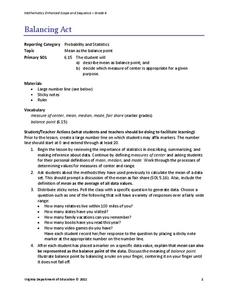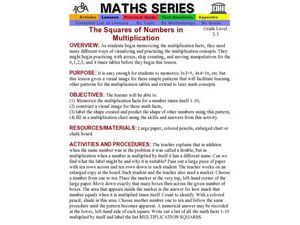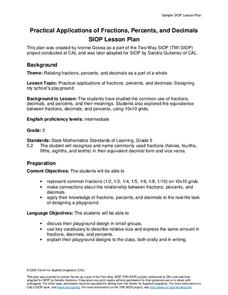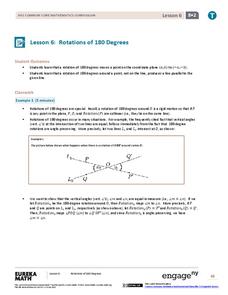Curated OER
Creating Fractals
Students solve problems using fractals. In this geometry lesson, students identify properties of fractals. They find patterns in their surroundings and relate it to the real world and math.
Virginia Commonwealth University
General Construction Measurement and Dimensions
Learners construct their understanding of measurement and dimensions in this step-by-step approach that begins with an all group vocabulary introduction, consisting of measuring objects and dialoging using measurement vocabulary....
Curated OER
Worksheet 22
In this math worksheet, students determine using geometry the radius of convergence of the Taylor series centered at x0 = 0 for the function
Noyce Foundation
Ducklings
The class gets their mean and median all in a row with an assessment task that uses a population of ducklings to work with data displays and measures of central tendency. Pupils create a frequency chart and calculate the mean and median....
EngageNY
First Consequences of FTS
Challenge the young mathematicians to find the exact coordinates of a dilated point. The fifth segment in a 16-part series introduces the class to the converse of the Fundamental Theorem of Similarity. Scholars use the theorem to find...
Curated OER
Pythagorean Theorem
Reinforce the use of the Pythagorean theorem with this problem solving lesson. Middle schoolers use the Pythagorean theorem to solve word problems. They work in pairs to find the answers to the problems, and then explain how they got...
Virginia Department of Education
Balancing Act
How many different interpretations of the mean are there? Scholars place numbers on a number line and determine the mean. They interpret the mean as the average value and as the balance point.
Curated OER
Average of Numbers
Fourth graders find the average of a set of numbers. In this math lesson plan, 4th graders add up a group of numbers and divide by the amount of numbers there are. They complete a worksheet and work in groups to find the averages in...
Curated OER
Social Studies: Renaissance
Students explore Renaissance architecture. In this Renaissance lesson, students view a slideshow featuring architecture of the era and then discuss the math skills used to the build the structures. Student build their own replicas of...
EngageNY
Informal Proofs of Properties of Dilations
Challenge the class to prove that the dilation properties always hold. The instructional activity develops an informal proof of the properties of dilations through a discussion. Two of the proofs are verified with each class member...
Curated OER
The Squares of Numbers in Multiplication
Learners make multiplication squares. For this math lesson, students review their multiplication facts and multiplication strategies. Learners are introduced to multiplication squares when multiplying a number by itself.
Inside Mathematics
Archery
Put the better archer in a box. The performance task has pupils compare the performance of two archers using box-and-whisker plots. The resource includes sample responses that are useful in comparing individuals' work to others.
Curated OER
Fun With Fractions
Students play a math game to gain a better understanding of fractions after visiting the American Revolution in the Time Machine. Students attempt to purchase pies from a local farmer. Students use sheets of paper to show knowledge of...
Lane Community College
Review Sheets: College Algebra
A jam-packed worksheet has all the topics you would teach in an Algebra II class with a variety of question styles. Starting with function notation and ending with geometric sequences, there really is something for everyone. Each topic...
Curated OER
Rocks and Minerals
Fourth graders participate in a Web quest to Internet sites to learn how to identify minerals, discover the types of minerals present in their homes, and learn about birthstones. Students also keep journals to track new information that...
Curated OER
Clock
In this telling time learning exercise, learners practice telling time by cutting out the hands and fix them to the center of the clock with a brad.
Curated OER
The Minimal Distance Point from the Vertices of a Triangle
Young scholars calculate the distance from the vertex of a triangle to the center. In this geometry lesson, students find the shortest distance between a point and the vertex of a triangle. They relate this concept of distance to the...
Curated OER
Load! Ready! Fire!
Pupils will identify the parts of a cannon and practice demonstrating a mock firing. In this math and science lesson, students read background information on the cannon and its firing. Pupils read about and role play positions near the...
Curated OER
To Be Or Not To Be, Soaked
Students test the absorbency of paper towels by dropping water onto the center of each towel and then find the surface area of the stain using a transparent grid. With both pieces of data, students analyze the results of their absorbency...
Center for Applied Linguistics
Practical Applications of Fractions, Percents, and Decimals
Young architects are prompted to design a playground in assigned groups. Using a 10 x 10 grid. Your fifth graders will apply their knowledge of fractions, percents, and decimals to the real-world task of designing a playground. Students...
EngageNY
Rotations of 180 Degrees
What happens when rotating an image 180 degrees? The sixth lesson in the series of 18 takes a look at this question. Learners discover the pattern associated with 180-degree rotations. They then use transparency paper to perform the...
EngageNY
Understanding Box Plots
Scholars apply the concepts of box plots and dot plots to summarize and describe data distributions. They use the data displays to compare sets of data and determine numerical summaries.
Curated OER
Appalachia
Learners investigate the benefits of dance and participate in dances. In this dance lesson, students investigate a number of dances such as square dancing and clogging that are native to Appalachia. They use math concepts to determine...
EngageNY
Definition of Rotation and Basic Properties
Examine the process of rotating images to visualize effects of changes to them. The fifth lesson of 18 prompts pupils to rotate different images to various degrees of rotation. It pays special attention to rotations in multiples of 90...

























